Sunday 3/5/06 Day One (part 4)
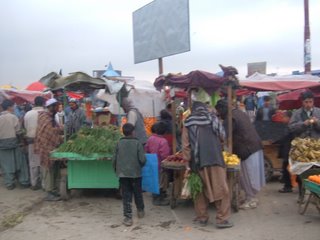
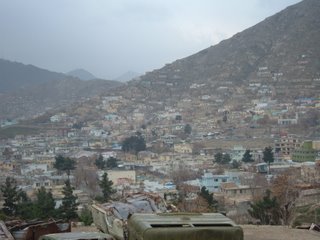 The aroma of our first scrumptious lunch drifted from the kitchen as we began to settle into what would be our home for the upcoming ten days. We briefly met our cooks, two men with kind faces and an older woman with silver hair tinted orange with henna peeking from under her headscarf. After introductions, they politely ducked back into the kitchen to finish preparing our welcoming lunch.
The aroma of our first scrumptious lunch drifted from the kitchen as we began to settle into what would be our home for the upcoming ten days. We briefly met our cooks, two men with kind faces and an older woman with silver hair tinted orange with henna peeking from under her headscarf. After introductions, they politely ducked back into the kitchen to finish preparing our welcoming lunch.Since lunch would still take another half hour, Najib decided to begin our orientation. We all sat around the cozy floor cushions in the living room as we were served a choice of green tea (chai sabzi) or black tea (chai siah), bowls of pistachios and the most heavenly yellow raisins that one could ever savor. With orientation packets in hand, Najib began with the subject of security; an issue of main concern for many on the delegation, as well as the main concern for probably all of our families and friends. Najib insisted right away that he didn't believe the security in Kabul to be as bad as the international news portrayed it to be. He continued to say that there is indeed violence still happening in other provinces, particularly in the south, like Kandahar. But Kabul is relatively secure, partly due to the strong military presence in the city. None the less, Najib asserted that as a group, we would still need to take precautionary measures by making sure that no individuals strayed from the group while out in the city and by getting the group back to the guesthouse by sun down.
The other issue that Najib addressed was that of electricity. He explained that the residents of Kabul were, at this point in time, granted electricity only every other day from 4:00 PM to midnight. The only buildings exempt from this were important Ministry/governmental offices. He said, however, that the guesthouse had applied with the Ministry for the ability to have 24 hours of electricity for the ten days that we were to be there and that the application had been approved. But, Najib continued, nothing is totally reliable and he insisted generously that he hoped the approval would manifest. As an alternative, however, the guesthouse has a generator that would be used as back up. In addition to my immense appreciation that they went to such measures, I honestly felt that the application for 24 hours of electricity was unnecessary and extravagant in relation to the state of the country, but then realized the pressure of having to please Westerners who are accustomed to such privileges. And if there is one adjective to describe Afghans, it would be 'hospitable'- most are extremely eager to accommodate guests. As the week proceeded, we would come to find out that despite the Ministry approval, our guesthouse didn't get electricity for 24 hours of every day. This didn't phase me or some of the other participants in the least bit. I was sad to see, however, that there were a few who couldn't contain their complaints and inflexibility over this matter.
After addressing the electricity issue, Najib began to speak about the trip itinerary and the organizations we would be meeting. The remainder of our time was packed full of meetings with Afghan individuals and organizations from 8:00 AM - 4:00 PM every day, including two short trips to villages immediately outside of Kabul. It was going to be an incredible and busy ten days.
After the orientation, our first Afghan lunch was served. Ohhhhhhhhh yummmmm. There was the most delectable home made bread in existence - a flat bread about an inch and a half thick made into long, oval pieces. Brown rice with plump raisins and shredded carrots steamed in mounds. Stews made of tender lamb and luscious, spiced tomato broths..... Yes, I am a big fan of traditional cuisine - every meal was a treat for me..... After our delicious lunch, we piled back into our vans to make a short excursion into town in order to exchange money and visit a park that overlooks the city. A trip back into the center of town gave opportunity to confirm the fact that yes, indeed, we are in Afghanistan, as well as the opportunity to further observe the social and physical landscape of Kabul.
Elliot reflects in An Unexpected Light, "I had seen photographs of Kabul in guidebooks from the 1960's and the sights had hardly changed. Years of conflict had paralyzed the hand of modernization. In the side streets time's touch was lighter. The roads grew more dusty; here shops and homes made from mud brick and timber bore the neglect less visibly than modern buildings. Shrouded women carried water in earthen vases and venerable, turbaned shepherds prodded their flocks forward at a timeless pace. Spice sellers sat between multicoloured mounds or weighed out flour and grain on scales balanced with stones, and at the butchers' stalls men hacked with iron axes at carcasses on wooden stumps polished and gently concave from years of use, and laid out severed heads in long rows like the grisly trophies of medieval conflicts."
In a short time, we arrived to where we would be changing our money from US dollar to the Afghan currency, the Afghani. We didn't arrive at a bank or even a building housing an official money changing business. We were dealing with the black market here. Our vans stopped on a street alongside a bustling vegetable market. Naqibullah, who was sitting in the front passenger seat, turned and asked for the money we wanted changed. Najib suggested that we would only need to change $100 US dollars for the basics of what we would need during our time there (daily lunch in the city, etc.) After the six of us in our van handed Naqibullah our money, he hopped out with $600 in his pocket. All the while as we waited, we were surrounded by the sites of locals haggling the equivalent of pennies for vegetables. The scene felt strange and somewhat unsettling for me as it served as a potent reminder of our privilege, recalling having read that civil servants in Afghanistan earn only $40 US dollars a month.
Naqibullah returned within minutes and our vans were off once again.....
Within a few more minutes, we turned down a street that began to incline. The street was lined with tall pine trees and stalls selling steaming garbanzo beans. Eventually we arrive at the end of the road at the top of the cliff overlooking the city and we all step out of the vans. The air was clean and crisp and the view was amazing. The atmosphere was serene in contrast to the animation of the city center. It was our first opportunity to put into perspective the fascinating layout of the city and see the tiny houses built into the side of the mountains. We stayed for approximately 15 minutes before making the 15-minute trek back to the guesthouse. Once back, we all spent the rest of the evening settling in, eating dinner and ending our evening early. I passed out by 8:00 PM. I had no doubt I'd be able to sleep until morning, in which our incredible time meeting organizations would begin.
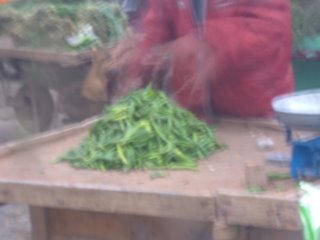
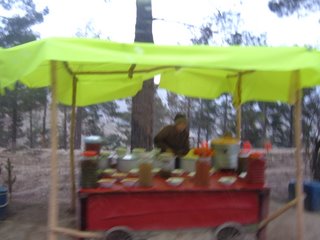
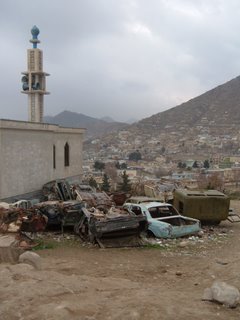
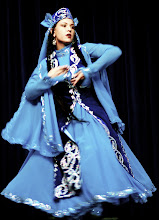

<< Home